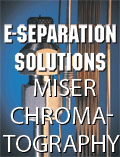New Minerals Analysis Manager Appointed
Assad Al-Ammar has joined Irvine Pharmaceutical Services, Irvine, California, as the new minerals analysis manager.
Assad Al-Ammar has joined Irvine Pharmaceutical Services, Irvine, California, as the new minerals analysis manager.
Al-Ammar has more than 25 years of experience of experience with inductively coupled plasma mass spectrometry and 15 peer-reviewed research papers published in both the United States and Europe. Additionally, Al-Ammar has seven years experience with liquid chromatography-inductively coupled plasma-mass spectrometry and gas chromatography-inductively coupled plasma-mass spectrometry speciation of toxic and pharmaceutically important elements and 15 years of experience with inductively coupled plasma-atomic emission spectroscopy, x-ray fluorescence, gas chromatography, and liquid chromatography.
Al-Ammar holds a Ph.D. in Analytical Chemistry from Glasgow University, United Kingdom, and was a postdoctoral fellow at the University of Massachusetts.
Al-Ammar will hold a new position at Irvine Pharmaceutical Services that was created in response to the newly proposed USP General Chapter for Elemental Impurities, which is scheduled to replace the General Chapter for Heavy Metals. The replacement will require the pharmaceutical, biopharmaceutical, excipient, nutraceutical, and medical device industries to comply with these changes by 2013.
Maximizing Cannabinoid Separation for Potency Testing with LC
April 7th 2025Researchers from the Department of Chemistry at Western Illinois University (Macomb, Illinois) conducted a study to optimize the separation of 18 cannabinoids for potency testing of hemp-based products, using liquid chromatography with a diode array detector (LC–DAD). As part of our monthlong series of articles pertaining to National Cannabis Awareness Month, LCGC International spoke to Liguo Song, the corresponding author of the paper stemming from this research, to discuss the study and its findings.
How Many Repetitions Do I Need? Caught Between Sound Statistics and Chromatographic Practice
April 7th 2025In chromatographic analysis, the number of repeated measurements is often limited due to time, cost, and sample availability constraints. It is therefore not uncommon for chromatographers to do a single measurement.







